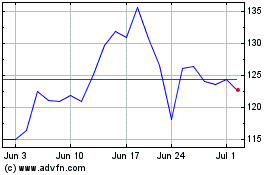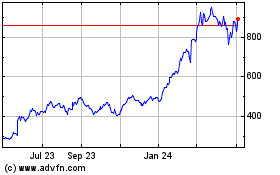Nvidia Reports 50% Sales Leap On Chip Demand -- WSJ
August 20 2020 - 3:02AM
Dow Jones News
By Maria Armental
This article is being republished as part of our daily
reproduction of WSJ.com articles that also appeared in the U.S.
print edition of The Wall Street Journal (August 20, 2020).
Graphic-chip maker Nvidia Corp. continued its run of strong
financial performance during the coronavirus pandemic, posting
record sales in the latest quarter propelled by strong demand for
online gaming and remote computing services.
The Santa Clara, Calif.-based company said earnings per share
for the quarter ended July 31 rose to 99 cents from 90 cents in the
year-ago period driven by a 50% jump in sales to $3.87 billion.
Wall Street expected earnings of 95 cents a share and $3.65 billion
in revenue.
"The pandemic will have a lasting impact on how we work,"
financial chief Colette Kress told analysts on a call, adding that
the company's sales mix would "likely reflect this evolution in
enterprise workforce trends with a greater focus on technologies,
such as Nvidia laptops and virtual workstations, that enable remote
work and virtual collaboration."
Nvidia shares have surged during the health crisis, making it
the best performing stock in the S&P 500 index and overtaking
Intel Corp. as the largest U.S. semiconductor company by value.
While Intel has stumbled with development of its newest chips,
punishing the stock, Nvidia has enjoyed investor favor because its
chips -- optimized to run the intense calculations for graphics --
are in hot demand as people turn to videogames for distraction
while stuck at home. The company is now valued at around $300
billion after its stock more than doubled this year, almost $100
billion more than Intel. Intel, in turn, has seen its stock fall
almost 20% in 2020.
Intel on Wednesday said it plans to buy back $10 billion of its
stock on an accelerated basis, as part of a $20 billion repurchase
program it suspended in March. "Intel shares are currently trading
well below our intrinsic valuation," Chief Executive Bob Swann
said, adding that data-driven chip demand gives him confidence in
the company's product plan.
Nvidia shares, which hit a record level this week, closed down
1% Wednesday and slid 1.7% in after-hours trading. Intel's stock
rose 3.9% after hours following its share repurchase
disclosure.
Nvidia also has benefited from higher demand for cloud-computing
infrastructure as more companies have shifted to working remotely,
helping deliver growth for vendors such as Amazon.com Inc. and
Microsoft Corp.
Many of Nvidia's chips also are sold to data centers, where they
make rapid calculations that power artificial intelligence. The
company's supercomputers are being used in the fight against the
coronavirus pandemic. Nvidia in May said it shipped the first DGX
A100 -- a new line of high-performance computers -- to the U.S.
Department of Energy's Argonne National Laboratory for Covid-19
research.
The company said last quarter's data-center business, which
includes DGX sales and revenue from recently acquired Mellanox
Technologies, more than doubled to a record $1.75 billion. Revenue
at its games segment increased 26% to $1.65 billion.
Nvidia, for the current quarter, projects record revenue of
about $4.4 billion. Wall Street is expecting $3.97 billion,
according to analysts surveyed by FactSet. Gaming and data-center
sales are projected to drive the increase, Ms. Kress said.
The recent strength for the data-center and gaming businesses
aren't just a temporary, pandemic-effect, Chief Executive Jensen
Huang said in the call. "This is the future," he said, "and there's
no going back."
The company, though, wasn't immune to effects of the pandemic on
the wider economy. Sales for its professional visualization segment
fell 30% from a year ago because corporate customers delayed
workstation spending, Nvidia said. Sales to the hard-hit car
sector, down 47% year-over-year, also weighed on revenue. Company
officials said auto production volumes have started to recover but
remain well below prepandemic levels.
"Despite the pandemic's impact on our professional visualization
and automotive platforms, we are well positioned to grow, as
gaming, AI, cloud computing and autonomous machines drive the next
industrial revolution around the world," Mr. Huang said.
Write to Maria Armental at maria.armental@wsj.com
(END) Dow Jones Newswires
August 20, 2020 02:47 ET (06:47 GMT)
Copyright (c) 2020 Dow Jones & Company, Inc.
NVIDIA (NASDAQ:NVDA)
Historical Stock Chart
From Mar 2024 to Apr 2024

NVIDIA (NASDAQ:NVDA)
Historical Stock Chart
From Apr 2023 to Apr 2024
